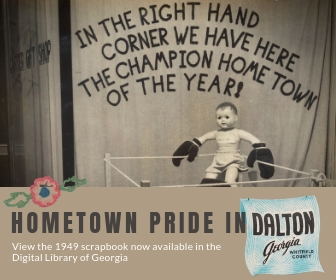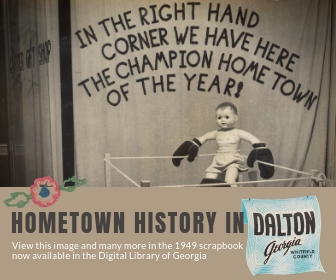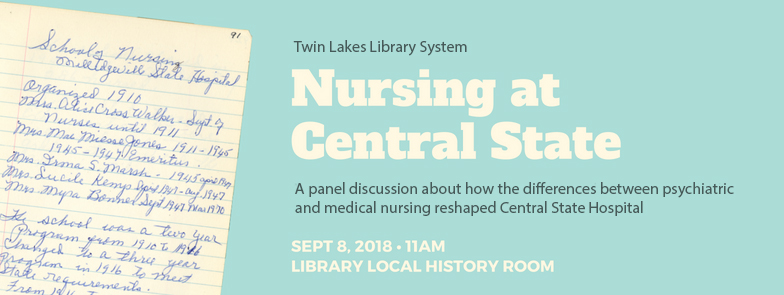CONTACT: Deborah Hakes, dhakes@georgialibraries.org, 404-852-5547
DALTON, Ga — An historic scrapbook documenting the history and progress of the city of Dalton has been digitized and added to the Digital Library of Georgia. Funding for this project was provided by Georgia HomePLACE, the digitization unit of the Georgia Public Library Service, in partnership with the Northwest Georgia Regional Library System.
The scrapbook is a window into Dalton’s past. Created by representatives of civic organizations and community leaders, the scrapbook was part of a submission package to the Georgia Power Company’s 1949 Champion Home Town Contest. The book includes many black-and-white photographs of Dalton during the late 1940s, as well as hundreds of newspaper clippings, typescript documents, and original illustrations all boosting the city’s prolific textile industry. Emblazoned in chenille on the clothbound scrapbook cover are the words, “Dalton, Ga., Bedspread Center of the World.”
“The textile industry and the mill village culture unites many Georgians,” explains Darla Chambliss, Director of the Northwest Georgia Regional Library System. “We are delighted to partner with HomePLACE to provide greater access to this “fuzzy and irreplaceable piece of history” for many, many neighbors and friends.”
The scrapbook provides details about Dalton’s business and industry, education, agriculture, tourism, and municipal development. Researchers, historians, and genealogists will find rich source material, including economic reports, club rosters, and before-and-after shots of building and infrastructure improvements around town. K-12 students and educators can use these local, historical materials to supplement social studies curricula.
“The scrapbook a reminder of the broader, national sense of lively small town pride and civic engagement endemic to the post-war years,” says HomePLACE Director Angela Stanley. “Viewing artifacts such as this through the lens of history, we can ask important questions about which citizens are included in its pages–and which aren’t.”
####
Georgia HomePLACE encourages public libraries and related institutions to participate in the Digital Library of Georgia. HomePLACE offers a highly collaborative model for digitizing primary source collections related to local history and genealogy. HomePLACE is supported with federal Library Services and Technology Act funds administered by the Institute of Museum and Library Services through the Georgia Public Library Service, a unit of the Board of Regents of the University System of Georgia.
Based at the University of Georgia Libraries, the Digital Library of Georgia is a GALILEO initiative that collaborates with Georgia’s libraries, archives, museums and other institutions of education and culture to provide digital access to key information resources on Georgia history, culture and life. The Digital Library of Georgia also serves as Georgia’s service hub for the Digital Public Library of America and as the home of the Georgia Newspaper Project, the state’s historic newspaper microfilming project.




